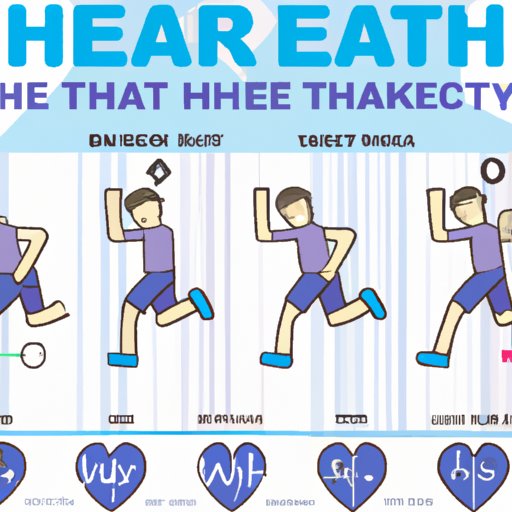Introduction
A dangerously high heart rate during exercise is defined as a heart rate that exceeds your maximum target heart rate and can be potentially dangerous or life-threatening. This article will explore the causes, symptoms, prevention, diagnosis, treatment, and long-term effects of a dangerously high heart rate during exercise, as well as provide tips for staying safe while exercising.
Causes of a Dangerously High Heart Rate
There are several possible causes of a dangerously high heart rate during exercise, including:
- Over-exertion: Pushing yourself too hard when exercising can cause you to exceed your maximum target heart rate, leading to a dangerously high heart rate.
- Dehydration: Not drinking enough water before and during exercise can cause your heart rate to increase beyond its normal range.
- Inadequate Warm-up or Cool-down: Not warming up or cooling down properly before and after exercise can lead to an increase in heart rate.
- Medications: Certain medications can interfere with the body’s natural regulation of heart rate and may cause it to become dangerously high during exercise.
- Medical Conditions: Certain medical conditions, such as anemia, thyroid disease, or diabetes, can cause your heart rate to become dangerously high during exercise.

Symptoms of a Dangerously High Heart Rate
If you experience any of the following symptoms during exercise, it could indicate a dangerously high heart rate:
- Palpitations: You may feel like your heart is racing or pounding.
- Chest Pain: You may experience tightness or pain in your chest.
- Shortness of Breath: You may find it difficult to catch your breath or feel out of breath.
- Lightheadedness or Dizziness: You may feel lightheaded or dizzy.

How to Prevent a Dangerously High Heart Rate
The following tips can help to prevent a dangerously high heart rate during exercise:
- Drink Plenty of Water: Make sure to drink plenty of water before, during, and after exercise to stay hydrated.
- Proper Warm-up and Cool-down: Spend at least 5-10 minutes warming up and cooling down before and after exercise to give your body time to adjust to the activity level.
- Listen to Your Body: Pay attention to how your body feels during exercise and take breaks when needed. If you feel any symptoms of a dangerously high heart rate, stop immediately.
- Monitor Your Heart Rate: Use a heart rate monitor to track your heart rate during exercise and make sure it doesn’t exceed your maximum target heart rate.

Diagnosing and Treating a Dangerously High Heart Rate
If you experience a dangerously high heart rate during exercise, it is important to seek medical attention right away. A doctor can perform a physical examination and order tests to determine the cause of the elevated heart rate. Treatment options may include lifestyle changes, medications, or other interventions depending on the underlying cause.
Long-Term Effects of a Dangerously High Heart Rate
If left untreated, a dangerously high heart rate during exercise can lead to serious cardiovascular complications, such as heart attack or stroke. Additionally, it can increase the risk of injury due to fatigue and overexertion.
Tips for Staying Safe During Exercise to Avoid a Dangerously High Heart Rate
To stay safe and avoid a dangerously high heart rate during exercise, follow these tips:
- Take Breaks During Exercise: Take regular breaks throughout your workout to give your body a chance to rest and recover.
- Wear Appropriate Clothing: Wear clothing that is comfortable and allows for adequate airflow to keep your body cool.
- Maintain a Healthy Diet: Eat a healthy diet that includes plenty of fruits, vegetables, whole grains, and lean proteins to fuel your workouts.
- Know Your Limits: Don’t push yourself too hard and pay attention to how your body is feeling. Stop if you feel any symptoms of a dangerously high heart rate.
Conclusion
A dangerously high heart rate during exercise can be potentially dangerous or life-threatening. It is important to recognize the causes, symptoms, and prevention of a dangerously high heart rate and seek medical attention if it occurs. By following these tips and listening to your body, you can stay safe and avoid a dangerously high heart rate during exercise.


